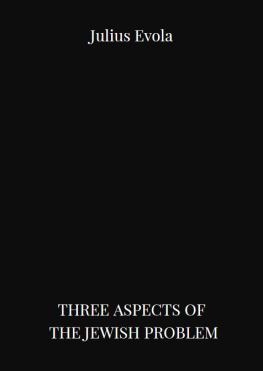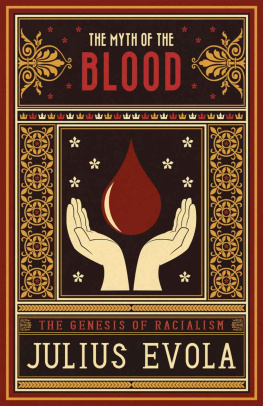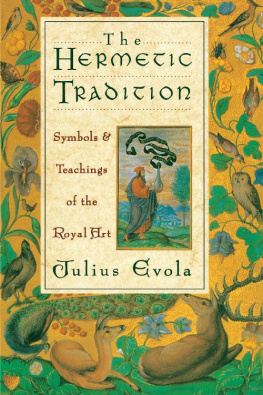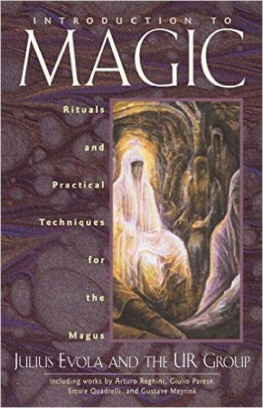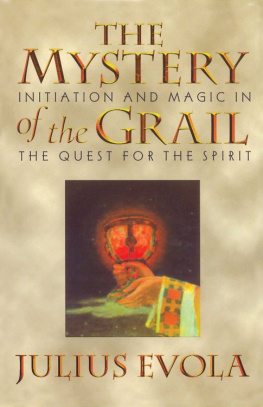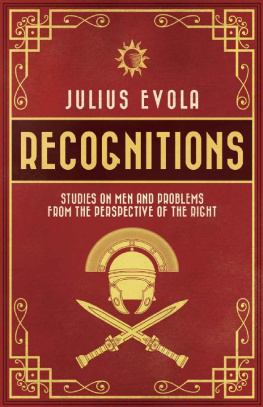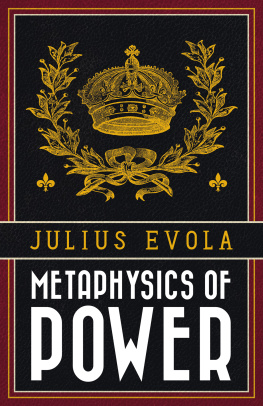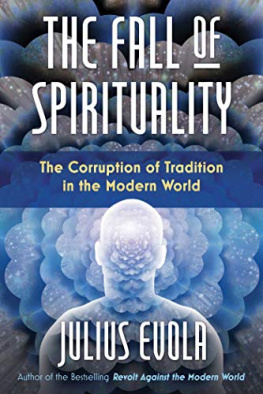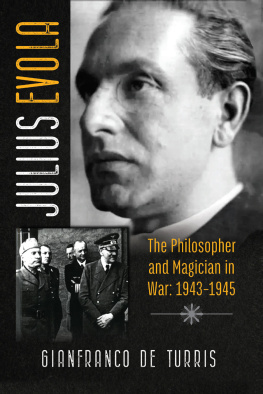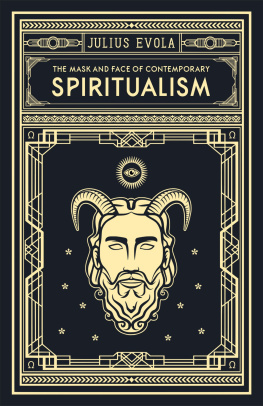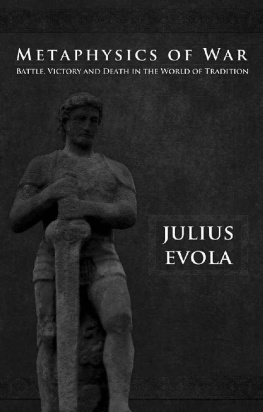Julius Evola - Three Aspects of the Jewish Problem
Here you can read online Julius Evola - Three Aspects of the Jewish Problem full text of the book (entire story) in english for free. Download pdf and epub, get meaning, cover and reviews about this ebook. year: 2019, genre: Science. Description of the work, (preface) as well as reviews are available. Best literature library LitArk.com created for fans of good reading and offers a wide selection of genres:
Romance novel
Science fiction
Adventure
Detective
Science
History
Home and family
Prose
Art
Politics
Computer
Non-fiction
Religion
Business
Children
Humor
Choose a favorite category and find really read worthwhile books. Enjoy immersion in the world of imagination, feel the emotions of the characters or learn something new for yourself, make an fascinating discovery.
- Book:Three Aspects of the Jewish Problem
- Author:
- Genre:
- Year:2019
- Rating:4 / 5
- Favourites:Add to favourites
- Your mark:
- 80
- 1
- 2
- 3
- 4
- 5
Three Aspects of the Jewish Problem: summary, description and annotation
We offer to read an annotation, description, summary or preface (depends on what the author of the book "Three Aspects of the Jewish Problem" wrote himself). If you haven't found the necessary information about the book — write in the comments, we will try to find it.
Three Aspects of the Jewish Problem — read online for free the complete book (whole text) full work
Below is the text of the book, divided by pages. System saving the place of the last page read, allows you to conveniently read the book "Three Aspects of the Jewish Problem" online for free, without having to search again every time where you left off. Put a bookmark, and you can go to the page where you finished reading at any time.
Font size:
Interval:
Bookmark:
THREE ASPECTS OF THE JEWISH PROBLEM
(Tre Aspetti del Problema Ebraico)
In the first chapter of this book, we dealt with Semitism in the religious and spiritual world; comparing Judaism with other civilisations of Semitic stock, studying the features which differentiate that civilisation as regards the concept of the divine and the attitude towards the divine from that which is peculiar to races of Indo-European (Aryan) origin, we have come to justify an anti-Semitic and, indirectly, anti-Jewish attitude on spiritual grounds, particularly as regards the prophetic forms that Jewish religiosity has assumed since the fall of the state of the chosen people.
In the second chapter, we dealt with Judaism (because it is to Judaism, and not to Semitism in general, that we have had to limit ourselves here) in the cultural world, and we only partially justified the anti-Semitic arguments; while acknowledging the negative action that the Jewish element diffused in the fabric of the various non-Jewish nations has often exerted, either as a disintegrating and debasing intelligence, or as a germ of rationalism, materialism and internationalism, we found extremely problematic the anti-Semitic argument according to which this action would be consonant with a pre-established plan, a real conspiracy of hatred, rather than a natural effect of certain predominant aspects of the innate Jewish character. If, in relation to the decay of civilisation in recent times, we have to speak of a plan, we have already seen that it must be conceived as a plan in which the Jewish element is only an instrument of influences whose real centre lies in a sphere very different from that which is merely conditioned by the souls of the races.
Such is the conclusion that we will also come to in this chapter, in which we propose to look at the motives for anti-Semitism in the political and economic field. There are basically two streams here, the first one being extremist and generalised, the other one being essentially practical and nationalist.
It can be said the first one is centred on the famous Protocols of the Elders of Zion . Much has been said on the supposed authenticity of this document, which purportedly was stolen from the archives of an occult Lodge, a sort of headquarters of international Judaism, and illegally disclosed by a person who for this very reason was subsequently assassinated by Jewish emissaries. But, as was quite rightly pointed out by Preziosi, who published this document in Italian, the question of its authenticity is basically of secondary importance for the following reason: such a document, published before the Great War, sets out a plan whose realisation is often impressively evidenced by recent history. Thus, even if this document were false and the methodically organised conspiracy it speaks of did not exist, the fact is nonetheless that it is as though it really existed, so that the concept of such a conspiracy is likely to be used as a working hypothesis to comprehend various social phenomena, events and upheavals, diverse but nonetheless convergent, that have the same collective signification. In his edition, Preziosi gathered various additional documents that reinforce such a point of view.
The plan of the Protocols is the one that we have already mentioned in the previous article: the will-to-power of Israel, which wants to gain control of the Christian world, blindly determined to prove itself elected by God for that purpose. It is just that, now, the motive is given in predominantly political and economic terms. The obstacles encountered by the Jews would have basically been all that made the West a unity of differentiated, monarchical and traditional national societies. It was thus, in the first place, a question of destroying all this, not directly it would have been impossible for the Jews to do this but indirectly: by spreading ideologies favouring social revolt; by seeking to tendentiously stress the negative aspects, the abuses and the injustices of the old regimes; by spreading the germs of a critical and rationalistic mentality meant to corrupt the innermost ethical cement of the old hierarchies; by encouraging, for the same purpose, materialism, individualism and the reduction of all interests to economic and financial ones, and, as a more direct practical action: to fuel and to sustain class-warfare, revolutions and even wars. Once Europe was shattered in this way and the idols of anarchic liberalism and gold were introduced into it, the traditional dyke able to create resistance to the Jew was breached and the offensive could be launched, Israels rise to power could start. Once the people were reduced to believing only in gold and to obeying the representatives of critical-rationalist culture and of public opinion, all the Jew had to do was to gain control of these instruments: the press, finance and the intellectual professions. That is how the vital threads of modern society would have invisibly ended up in the hands of Israel. Nations, governments, parliaments, trusts, and so on, without even realising it, become its instruments. It only remains to lead, by hidden means, the peoples, and above all their lower strata, to a state of exasperation and turmoil likely to bring about the final collapse. Israel will then appear as a universal sovereign, heralding truth and justice for peoples reduced to masses without personality, without freedom, without proper tradition.
Such is, in brief, the plan contained in the Protocols . These have exerted a tremendous influence on anti-Semitism, an influence which, in many respects, has reached Hitler himself. We shall consider the extent to which a vision of this kind contains elements that correspond to reality.
The first thing to be conceded is that the course of the social and political history of modern Europe seems in fact to meet the objectives set out in the Protocols ; collapse of the ancient monarchical-aristocratic constitutions, revolutionary illuminism, the doctrine of natural law, the advent of the liberal-democratic bourgeoisie, capitalist oligarchy and the omnipotence of economic forces, and finally, Marxism, and, after the collapse that followed the world war Bolshevism. But, once again, the problem here is to know to what extent the associates of Judaism can really be considered to be the leading elements of such phenomena, or, at least, as those who have encouraged it. It is natural that those who, like von Moltke, believe in Unknown Superiors, themselves dependent on a supreme Leader named The Prince of Slavery, who would not only be obeyed by the main centres of Judaism spread around the world, but would also act through judaising elements, as well as through non-Jewish ones it is natural that those who believe this can always see the Jew everywhere, for they move back to a field in which no positive study can be decisive any more.
A few points can be clarified though. There is, without question, a connection between the Jewish tradition and Freemasonry. In 1848, the Freemason von Knigge wrote: The Jews have admitted that Freemasonry was a means to build their secret empire on a solid basis. To formulate an overall opinion on Freemasonry, various elements should be taken into consideration. It seems that, initially, before the French revolution, Freemasonry was above all an initiatory organisation, more or less connected with Rosicrucianism, and, therefore, with spiritual traditions deriving essentially from the high Middle-Ages (the Templars, the Fedeli dAmore, and so on). It is only subsequently that Freemasonry assumed the militant features and the tendencies known by everyone, by means of a real distortion of the elements it had taken from the spiritual traditions that we have just referred to; and this is how, for example, from a supra-Catholic attitude (such as the Templars supposedly had), an anti-Catholic and, finally, secular and illuministic attitude was arrived at. In this second period, Freemasonry might very well have obeyed Jewish influences. But, although this is not taken note of in all its significance, it is undeniable that Freemasonry in its turn played a part in the theoretical and also, according to some people, material preparation of the French revolution, the first embryo of all subsequent anti-traditional upheaval in Europe.
Font size:
Interval:
Bookmark:
Similar books «Three Aspects of the Jewish Problem»
Look at similar books to Three Aspects of the Jewish Problem. We have selected literature similar in name and meaning in the hope of providing readers with more options to find new, interesting, not yet read works.
Discussion, reviews of the book Three Aspects of the Jewish Problem and just readers' own opinions. Leave your comments, write what you think about the work, its meaning or the main characters. Specify what exactly you liked and what you didn't like, and why you think so.

